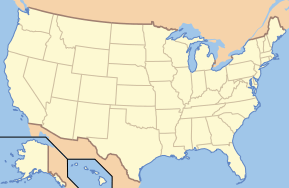George B. Hartzog, Jr.
| George B. Hartzog, Jr. | |
|---|---|
|
George B. Hartzog | |
| Born |
January 22, 1920 Smoaks, South Carolina[1] |
| Died |
June 27, 2008 (aged 88) Washington, D.C. |
| Occupation | lawyer, Director of the National Park Service |
George B. Hartzog, Jr. (March 17, 1920 – June 27, 2008) was an American attorney and Director of the National Park Service. Admitted to the bar in South Carolina in 1942, he became an attorney for the General Land Office (now the Bureau of Land Management) in the Department of the Interior in 1945, and six months later transferred to the National Park Service.
He moved to field assignments at Great Smoky Mountains and Rocky Mountain National Parks, and then made his name advancing the Gateway Arch project as superintendent of Jefferson National Expansion Memorial from 1959 to 1962. After briefly leaving the service he returned as associate director in 1963 with the promise of succeeding Conrad Wirth in January 1964. As Director, he served as Stewart Udall’s right arm in achieving a remarkably productive legislative program that included 62 new parks, the National Historic Preservation Act of 1966, and the Bible amendment to the Alaska Native Claims Settlement Act that led to establishment of the Alaska parks. During his nine-year tenure, he enlarged the service's role in urban recreation, historic preservation, interpretation, and environmental education.
Hartzog was dismissed in December 1972 after he pioneered the Washington Monument Syndrome political tactic. He practiced law in Washington, D.C. until his death on June 27, 2008.[2]
Footnotes
- ↑ Hartzog, Jr., George B. Battling for the National Parks. New York: Mt. Kisco, 1988.
- ↑ Schudel, Matt. (July 6, 2008.) "Obituaries: George B. Hartzog Jr., 88; Expanded Nation's Park System. The Washington Post. Retrieved on June 14, 2010.
Further reading
External links
- George B. Hartzog Jr. Papers at Clemson University Special Collections Library
| Government offices | ||
|---|---|---|
| Preceded by Conrad L. Wirth |
Director of the National Park Service 1964–1972 |
Succeeded by Ronald H. Walker |

